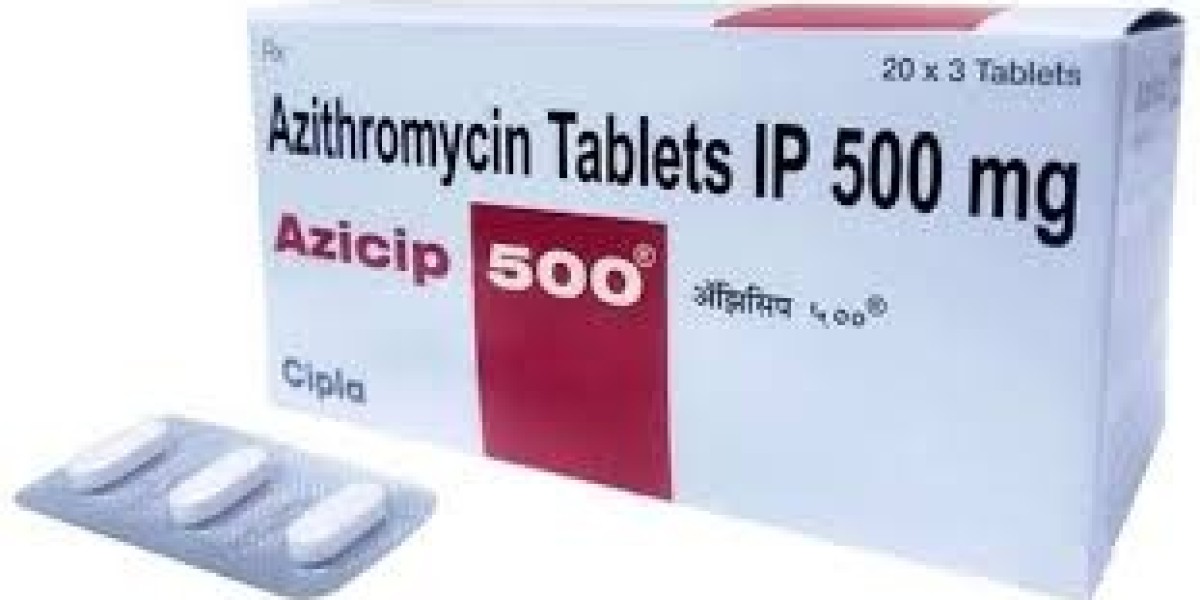Azicip 500mg Tablet, a commonly prescribed antibiotic, is used to treat a variety of bacterial infections. This guide provides an in-depth look at its uses, mechanism of action, dosage, benefits, side effects, and precautions to help you understand how this medication works and how to use it effectively.
What is Azicip 500mg Tablet?
Buy azithromycin online Tablet contains the active ingredient azithromycin, which belongs to a class of antibiotics known as macrolides. Macrolides work by inhibiting the growth of bacteria, thus helping to eliminate the infection from the body. Azithromycin is effective against a wide range of bacteria, making Azicip 500mg a versatile and widely used antibiotic.
Uses of Azicip 500mg Tablet
Azicip 500mg Tablet is used to treat various bacterial infections, including:
- Respiratory Infections: Such as bronchitis, pneumonia, and sinusitis.
- Ear Infections: Including otitis media.
- Skin Infections: Like cellulitis and impetigo.
- Throat Infections: Such as pharyngitis and tonsillitis.
- Sexually Transmitted Infections (STIs): Including chlamydia and gonorrhea.
- Gastrointestinal Infections: Such as traveler's diarrhea caused by specific bacteria.
How Does Azicip 500mg Tablet Work?
Azicip 500mg Tablet works by interfering with the protein synthesis of bacteria. Azithromycin binds to the bacterial ribosome, a crucial part of the protein synthesis machinery, thus preventing bacteria from producing essential proteins needed for their growth and multiplication. By inhibiting protein synthesis, azithromycin effectively halts the growth of bacteria and allows the immune system to eliminate the remaining bacteria.
Dosage and Administration
The dosage of Azicip 500mg Tablet varies depending on the type and severity of the infection, as well as the patient’s age and weight. It is essential to follow the prescribed dosage instructions provided by your healthcare provider.
For adults, the typical dosage for most infections is:
- Respiratory and Skin Infections: 500mg once daily for three days.
- Sexually Transmitted Infections: A single dose of 1g (1000mg).
- Traveler's Diarrhea: 500mg once daily for three days.
Children’s dosages are calculated based on their weight and the type of infection being treated.
Benefits of Azicip 500mg Tablet
- Broad-Spectrum Activity: Azicip 500mg Tablet is effective against a wide range of bacteria, making it suitable for treating various infections.
- Convenient Dosage: The once-daily dosing and short treatment duration (usually three to five days) improve patient compliance.
- Well-Tolerated: Azithromycin generally has fewer side effects compared to other antibiotics, making it a preferred choice for many patients.
- Effective for STIs: Azithromycin is particularly effective in treating sexually transmitted infections like chlamydia and gonorrhea.
- Alternative for Penicillin-Allergic Patients: It is a good option for individuals allergic to penicillin or other beta-lactam antibiotics.
Side Effects of Azicip 500mg Tablet
While Azicip 500mg Tablet is generally well-tolerated, some patients may experience side effects. Common side effects include:
- Gastrointestinal Issues: Nausea, vomiting, diarrhea, and abdominal pain.
- Headache: Mild to moderate headaches can occur.
- Dizziness: Some patients may feel dizzy or lightheaded.
- Skin Reactions: Rash or itching can occur in some individuals.
In rare cases, more severe side effects may occur, such as:
- Allergic Reactions: Severe allergic reactions (anaphylaxis) are rare but require immediate medical attention.
- Liver Problems: Signs include jaundice (yellowing of the skin or eyes), dark urine, and severe fatigue.
- Heart Issues: Azithromycin can cause changes in heart rhythm (QT prolongation), which can be serious in some patients.
Precautions and Interactions
Before taking Azicip 500mg Tablet, it is important to inform your healthcare provider about any other medications you are taking, as well as any existing medical conditions. Specific precautions include:
- Pregnancy and Breastfeeding: Consult your doctor before using azithromycin if you are pregnant or breastfeeding.
- Liver or Kidney Disease: Patients with liver or kidney issues should use azithromycin with caution.
- Heart Conditions: Those with a history of heart problems, including arrhythmias, should discuss potential risks with their doctor.
Drug Interactions
Azicip 500mg Tablet can interact with other medications, potentially affecting their efficacy or increasing the risk of side effects. Notable interactions include:
- Antacids: Can reduce the absorption of azithromycin; it is recommended to take Azicip 500mg Tablet at least 1 hour before or 2 hours after antacids.
- Warfarin: Azithromycin can enhance the effects of warfarin, increasing the risk of bleeding.
- Digoxin: Can increase digoxin levels in the blood, necessitating monitoring.
- Other Antibiotics: Combining azithromycin with other antibiotics should be done under medical supervision.
Conclusion
Azicip 500mg Tablet is a highly effective antibiotic for treating a variety of bacterial infections. Its broad-spectrum activity, convenient dosing, and generally well-tolerated nature make it a popular choice among healthcare providers and patients. However, like all medications, it is essential to use Azicip 500mg Tablet as prescribed and to be aware of potential side effects and interactions. Always consult your healthcare provider for personalized medical advice and treatment plans.








